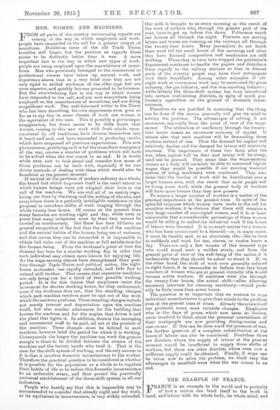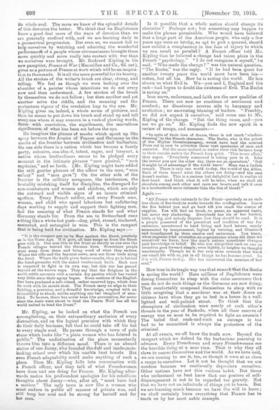THE EXAMPLE OP FRANCE,
FRANCE is an example to the world and to posterity of bow a nation can bend itself to the work in hand, and labour with its whole body, its whole mind, and its whole soul. The more we know of the splendid details of this devotion the better. We think that we Englishmen know a good deal more of the waye of devotion than we are generally credited with, and we are learning daily in a geometrical progression. But even so, we cannot fail to help ourselves by watching and admiring the wouderful performanet of a people whose circumstances brought them more quickly and more really into contact with war than we ourselves were brought. Mr. Rudyard in his new pamphlet, France at War (Macmillan and Co., fid. net), gives us a picture of France at work which- will be an inspira- tion to thousands.' It is all the more powerful for its brevity. All the strokes of the writer's brush are clear, strong, and telling. We feel as though we were looking over the shoulder of a painter whose intentions we do not every now and then understand. A few strokes of the brush by themselves we do not follow ; but then another and yet another solve the riddle, and the meaning and the portentous vigour of the revelation leap to the eye. Mr. Kipling gives us, indeed, a whole series of pictures, and then he seems to put down his brush and stand up and, tell every one whom it may concern in a rush of glowing words, fierce with conviction, the significance, the marvellous significance, of what has been set before the eye.
Ho imagines the plumes of smoke which spout up like spray between the Armies of France and Germany as the marks of the frontier between civilization and barbarism. On one side there is a nation which has become a family party, cohesive, one-idea-d, intent, eager, and buoyant, a nation whose brotherliness seems to be pledged every moment in the intimate phrases "mon general," "mon eapitaine," and so forth. (Mr. Kipling might have added the still gentler phrases of the officer to the man, " mon enfant" and "mon gars.") On the other side of the frontier is the military arrogance, the intolerance, the brutality mistaking itself for discipline, the disregard for non-combatants and women and children, which are only the outward and visible signs of an innate criminal egotism. Every French soldier, and every French man, woman, and child who spend laborious but unfaltering days working to supply and support their fighting men, feel the meaning of what France stands for and what Germany stands for. From the sea to Switzerland runs a thing like a white-hut gash—dug, piled, stoned, timbered, concreted, and entangled in wire. This is the rampart that is being held for civilization. Mr. Kipling says :- "It is the rampart put up by Man against the Beast, precisely as in the Stone Age. If it goes, all that keeps us from the Beast goes with it. One sees this at the front as clearly as one sews the French villages behind the German lines. Sometimes people steal away from them and bring word of what they endure. Whore the rifle and the bayonet serve, men use those tools along the front. Where the knife gives better results, they go in behind the hand-grenades with the naked twelve-inch knife. Each race is supposed to fight in its own way, but this war has passed beyond all the known ways. They say that the Belgians in the north settle accounts with a certain dry piteeion which has varied very little since their agony began. Some sections of the English line have produced a soft-voiced, rather reserved type, which does its work with its mouth shut. The French carry an edge to their fighting, a precision, and a dreadful knowledge, coupled with an insensibility to shook, unlike anything one has imagined of man- kind. To be sure, there has never been like provocation, for never since the Aesir went about to bind the Fenria Wolf has all the world united to bind the Beast."
Mr. Kipling, as he looked on what the French are accomplishing, on their extraordinary exclusion of every distraction, and on the logical precision with which they do their daily business, felt that he could take off his hat to every single soul. He passes through a town of pale stone which looks like " a plain woman who has fainteol in public." The undistinction of the place momentarily throws him into a different mood. There is an absurd statue of one Jenny, who founded the dull and inadequate- looking school over which his marble bust broods. Not even French adaptability could make anything of such a place. Then Mr. Kipling falls into conversation with a French officer, and they talk of what Frenchwomen have done and are doing for France. Mr. Kipling after- wards makes his profoundest apologies for his rebellious thoughts about Janny—who, after all, " must have had a mother." The ugly town is now like a woman who must endure in public all manner of private woe, and still keep her soul and be strong for herself and for her men. Is it possible that a whole nation should change its character ? Perhaps not • but something may happen to make the phrase permissible. Who would have believed that a large part of the American people, who only a few years ago were so tetchy, so apt to pick a quarrel, should now exhibit a complacency in the face of injury to which we can recall no parallel ? A French officer told Mr. Kipling that he believed a change had taken place in the French " psychology." "I do not recognize it myself," he said. " Who made the change ? " was the natural question. "The Beebe," was the reply. "If he had been quiet for another twenty years the world must have been his— rotten, but all his. New he is saving the world. He has shown us what Evil is, We—you and I, England and the rest—had begun to doubt the existence of Evil. The Beebe is saving us," Iron nerve, endurance, and faith are the new qualities of France. There are now no reactions of sentiment and conduct; no disastrous reverse side to buoyancy and exultation ; no enervating blaming of leaders. " Frankly, we did not expect it ourselves," said some one to Mr. Kipling of the change. "But the thing came, and—yon see we go on." Mr. Kipling finds the now spirit in to review of troops, and commouts:— "In spite of their love of drama, there is not much window- dressing' in the French character. The Boehe, who is the priest of the Higher Coanterjumpery, would have half the neutral Press out in care to advertise these vast spectacles of men and material. But the same instinct as makes their rich farmers keep to their smocks makes the French keep quiet. ' This is our affair,' they argue. 'Everybody concerned is taking part in it. Liko the review you saw the other day, there are no spectators.' 'But it might be of advantage if the world knew.' Mine was a foolish remark. There is only one world to-day, the world of the Allies. Each of them knows what the others are doing—and the rest doesn't matter. This is a curious but delightful fact to realize at first hand. And think what it will be later, when we shall all circulate among each other and open our hearts and talk it over in a brotherhood more intimate than the ties of blood!"
Again :— "All France works outwards to the Front—precisely as an end- less chain of fire-buckets works towards the conflagration.. Leave the fire behind you and go back till you reach the source of supplies. You will find no break, no pause, no apparent baste; but never any slackening. Everybody has his or her bucket:, little or big, and nobody disputes how they should be used. It is a people possessed of the precedent and tradition of war for existence, accustomed to hard living and hard labour, sanely economical by temperament, logical by training, and illumined and transfigured by their resolve and endurance. You know, when supreme trial overtakes an acquaintance whom till then we conceived we know, how the man's nature sometimes changes past knowledge or belief. Ile who was altogether such an one as ourselves goes forward simply, even lightly, to heights we thought unattainable. Though he is the very same comrade that lived our small life with us, yet in all things he has become groat. So it is with Franco to-day. She has discovered the measure of her How true in its tragic way was that remark that the Bache is saving the world ! Here millions of Englishmen were dosing themselves to sleep with the calm assurance that men do not do such things as the Germans are now doing. They comfortably composed themselves to sleep with as little misgiving that a, murderer was at their doors as citizens have when they go to bed in a house in a well- lighted and well-policed street. To think that the champions of civilization were nearly at each other's throats in the year of Fashoda, when all their reserve of energy was so soon to be required to fight an assassin 1 The belief that such-and-such an outrage is too bad to be committed is always the protection of the criminal.
At all events, we all know the truth now. Beyond the rampart which we defend lie the barbarians yearning to Frenchman and every Frenchwoman see advance. Every the horrible thing at a near view. That is why they all slave to rescue themselves and the world. As we have said, we are coming to see it, too, as though it were at as close a range to ourselves. Let it not be thought that we are careless because we continually depreciate ourselves. Other nations have not this curious habit. But those who understand us best know tied our posture of self-, disparagement is not to be regarded too gravely. Not that we have not an infinitude of things yet to learn. But we are learning much because we have the will to learn ; we shall certainly learn everything that France has to teach us by her most noble example.















































 Previous page
Previous page